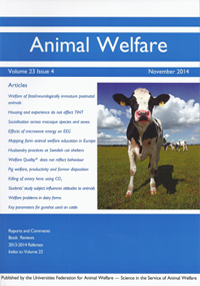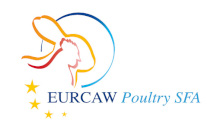Document type: scientific article published in Animal Welfare
Preview: Positive stockperson attitudes to his or her animals is associated with a positive behavioural response in the animals and in other indicators assumed to reflect a high level of welfare as well as increased productivity, eg in milk yield. Conversely, negative attitudes have been found to have the opposite effect. However, so far, no attempt has been made to link the attitudes of stockpersons to outcomes of comprehensive protocols assessing animal welfare at farm level. In the study reported here, attitudes of Danish dairy farmers are compared with the on-farm welfare of dairy cows as assessed by the Welfare Quality® (WQ) protocol. In 35 dairy herds the welfare was assessed, and the farmers filled in a self-report questionnaire on their attitudes to dairy cows and how they should be handled. The farmers on the farms with the lowest total welfare score could, according to the self-report questionnaire, be characterised as those with a negative attitude to the handling of cows (eg less strongly disliked to kick a cow or use a stick, when necessary). As expected, farmer behavioural attitudes regarding different situations correlated: for example, farmers who liked more to work with and have positive interactions with the cows also agreed more on patient handling and the importance of regular positive contact. Furthermore, farms where farmers gave cows a positive characteristic were found to score highly on the WQ principle 'Appropriate behaviour'.




